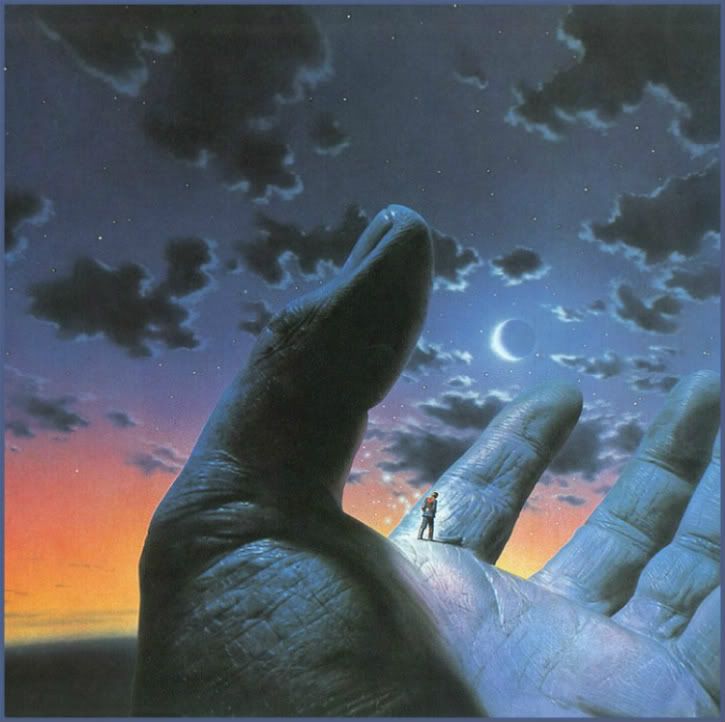
"The Cosmic Puppets," by Philip K. Dick
Spoilers...
I liked the earliest parts of the story when Ted Barton comes into Millgate and he's been telling his wife all these stories on the way there and probably boring her half to death. Then he gets there and he knows something isn't right. My memory has never been as good as Barton's seems to be in this novel, but there are definitely certain towns that I knew as a child that I'd still know quite well today.
After he is confronted with this differentness, he leaves the town and drops his wife off somewhere. I thought this was really interesting because especially in such a short novel it kind of broke the building of tension. The story might have been more effective if he had tried to leave the town with his wife and found that he couldn't. However, I was just as happy to see the wife character go, because she would have been annoying, since she was written without any redeeming qualities. I also thought it was significant that he dropped her off, because he knew on some level that he was going on some kind of "spiritual" or "hero's" journey and that's a journey a man must go on alone. My wife and I often take separate weekend trips. It always feels like I'm reconnecting with myself, like I forget what it was like to be on my own.
I really enjoyed the first interaction between Peter and Barton. Barton plays it cool and Peter ends up giving away more of his secrets than he probably intended to.
The next scene that stuck with me was the moment the Wanderers first appear and Barton says, “Did you see them?" and Doctor Meade says, "It’s perfectly natural. What’s so strange about that?” That was the first place in the book where I really began to wonder what the heck was going on.
I really liked the scene where Barton tries to get past the barrier. Someone should make it into a short film, Barton jumping from log to log while time and space changes all around him.
The scene with Christopher and his spell remover was memorable. I liked the detail that the device itself did nothing, the real power was in Barton and Christopher's minds. However, it was at this point in the novel when I began to question how much one could rely on their memories from 18 years ago and/or childhood memories.
My memory for everyday things has always been pretty poor. I can sing every song I used to sing at summer camp when I was a kid, but my memories of my friends or camp counselors at that time is almost nonexistent. I could tell you about some of the cartoons I used to watch as a kid, but I doubt I could tell you much about my neighborhood or the park near my house.
So anyway, I was more than a little bit skeptical that Barton's memory could be as accurate as he thought he needed it to be. Though the scene when Mary comes upon Barton and Christopher in the park and they are "yelling and gesturing" like mad men is priceless.
When the novel reaches it's climax and the two Zoroastrianism Gods take their true form and start to duke it out in the spatial or spiritual realm is where I got kind of lost. First off, I don't know if my education is just lacking, but I'd never even heard of Ahriman or Ormazd let alone understand their significance in a cultural context. Maybe all we needed to understand was that Ormazd was good and Ahriman was bad?
One odd part of the novel was p. 86 when pre-pubescent Mary takes all her clothes off and rubs oil all over her body to appease a golem she had captured. Then when you get to the ending and Mary turns out to be a God, Barton suddenly has the hots for her. Before she even takes an adult human form he's asking her if she can stay on Earth. I'd understand these kinds of feeling after he'd seen her as a woman, but at that point she'd only been a pre-teen girl and a golem. Was Dick trying to put uncomfortable subject matter in the novel or did he do so unconsciously? I don’t know which answer is worse.
It wasn't fantastic, but it wasn't bad either, I'd have to give it some sort of neutral score like 6 or 7 out of 10.
Notes:
On p 102. Meade mentions the bible verse from 1 Corinthians 13 "Through a glass darkly." That same verse would inspire the title of Dick's 1977 novel "A Scanner Darkly." I guess it was a concept that stuck with him for a while huh?
I read a copy from the library; it was the Vintage Books, November 2003 paperback. One of the earlier editions of Cosmic Puppets was a sewn edition. I know this because this edition used the original typeset which included gathering markers or signatures. They were labeled C.P.-B through C.P.-F and they appear approximately every 25 pages. When books were sewn together the pages were first formed into gatherings and those gatherings where sewn together to form the text block.
"The Cosmic Puppets" art work is by Chris Moore.
Thx for the plain-talking reaction notes, John. I'll tuck them away for when I get around to Cosmic Puppets.
ReplyDelete